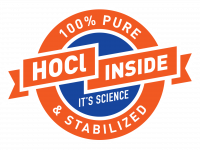HOCl Kills Hard-to-Kill B. Cereus Bacteria

Bacillus cereus (B. cereus) is a class of bacteria which, under adverse conditions, can form spores. B. cereus is part of a class of spores known as “endospores”. Endospores can withstand extremes in temperature from nearly absolute zero up to 150°C. They can also withstand various chemicals, ultraviolet radiation, drought, sterilization, pasteurization, antimicrobial treatments, and lack of nutrients. When B. cereus endospores are exposed to favorable growing conditions, they can contaminate raw or processed food. They can also contaminate the human body by entering through damaged human skin. This contamination can become toxic. If humans become infected by B. cereus, it can cause mild food poisoning, or even very dangerous non-intestinal infections.
In 2000, a research team confirmed HOCl was the primary agent within “electrolyzed oxidizing” water that was responsible for killing B. cereus endospores. As B. cereus endospores are very difficult to kill, it is indeed encouraging HOCl has been shown to be effective at killing these hard-to-kill bacterium. For more detail on B. Cereus, see here.
